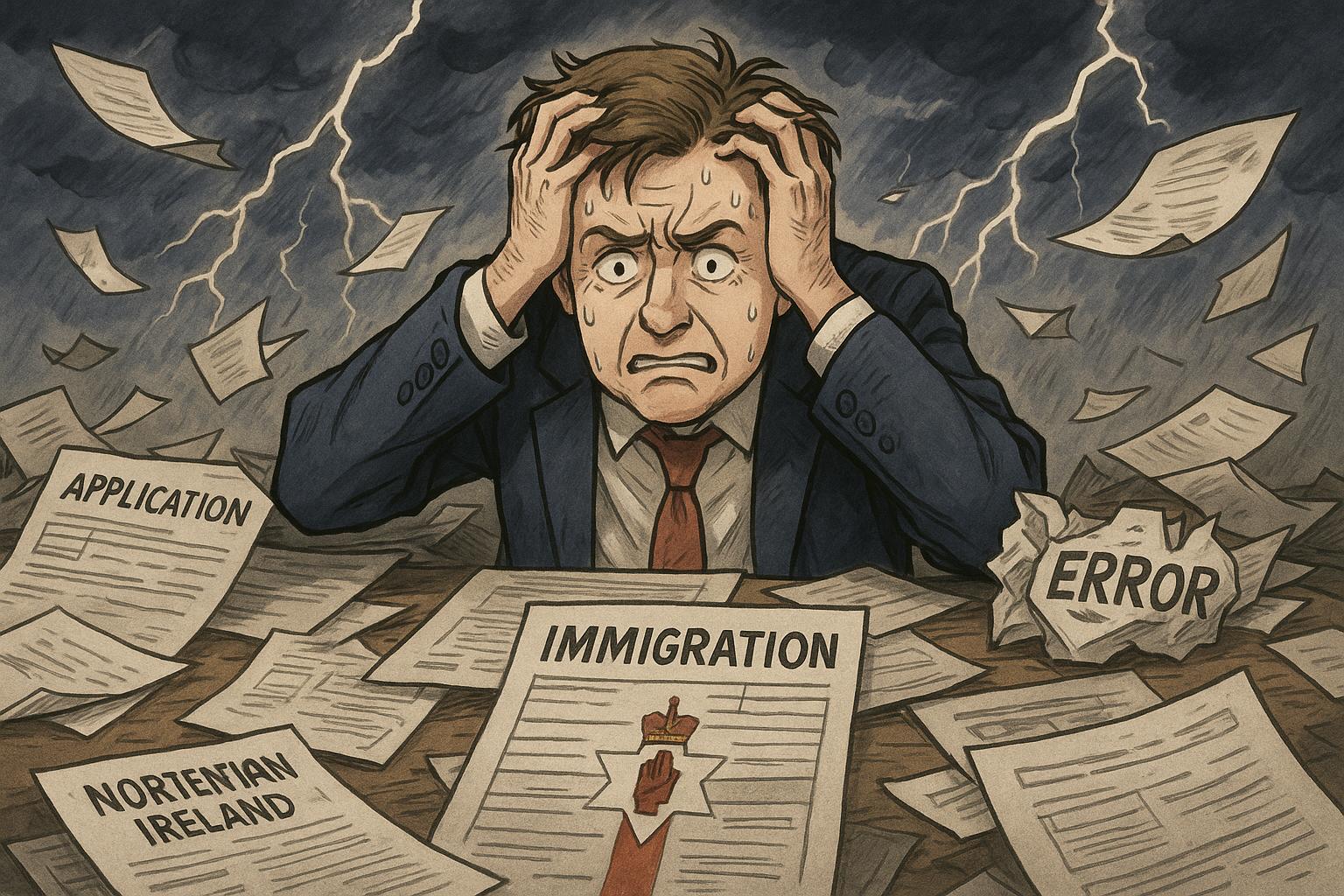An administrative lapse by Stormont ministers has resulted in a failure to respond to critical UK immigration proposals, risking severe labour shortages in Northern Ireland and complicating the region’s political and economic landscape amid new legal and policy challenges.
The Stormont executive’s failure to respond to the British government’s recent immigration proposals has been attributed to a clerical error. This oversight has significant implications for Northern Ireland’s economy, particularly regarding potential labour shortages. The Home Office had sought input from the devolved administrations on its white paper aimed at reducing net migration to the UK. However, Stormont’s ministers did not relay their concerns to Whitehall, unlike their counterparts in Scotland and Wales.
A senior source revealed that this lapse stemmed from an administrative mishap, a claim that has yet to receive official clarification following a request for explanation from the media. The white paper outlines measures to tighten immigration controls, including mandatory English tests for visa applicants and an extension of settled status applications from five to ten years. Economists and local ministers have expressed alarm over the proposals, fearing they could exacerbate existing labour shortages in key sectors.
Caoimhe Archibald, Minister for the Economy, reported a predicted annual undersupply of around 5,440 workers due to these immigration curbs, emphasising that any reduction in economic immigration would adversely affect Northern Ireland’s growth. Meanwhile, Agriculture and Environment Minister Andrew Muir raised concerns about the sustainability of local industries, particularly in agriculture, where sectors like mushroom farming and fishing are already facing inadequate labour availability.
Chair of the Executive Office Committee, Paula Bradshaw, has articulated the urgency of the situation, stating that a failure to respond to such a critical issue is unacceptable. She highlighted the need for transparency regarding when the clerical error was identified and what steps have been taken to rectify it. Given that four ministers in the Executive Office are responsible for collective action, there is a public demand for accountability and clarity about future measures.
This incident occurs in a broader context where Northern Ireland’s political landscape is increasingly complex. Recent rulings by the Belfast High Court have further complicated immigration policies in the region, declaring that significant parts of the UK’s Illegal Migration Act cannot be enforced in Northern Ireland due to the provisions of the Windsor Framework. This has raised concerns about the future of immigration controls and the maintenance of human rights across the United Kingdom. The court’s decision underscores legal arguments that the UK government’s unilateral approaches to legislation could undermine the rights of asylum seekers, exacerbating tensions among local political factions.
In light of these developments, unionist parties have expressed fears about Northern Ireland becoming a “magnet for asylum seekers,” advocating for a strict approach to immigration and urging the UK government to ensure that immigration laws are applied uniformly across the region. This aligns with sentiments shared by the interim leader of the Democratic Unionist Party (DUP), who has echoed the sentiment of protecting Northern Ireland’s interests amid concerns that the region faces unique challenges in managing immigration.
As Northern Ireland navigates these turbulent waters, the need for effective communication between the Stormont executive and the UK government has never been more vital. Given the mixed sentiments and opposition both towards rigorously imposed immigration controls and the implications of national policies, Northern Ireland’s political leaders are urged to work collaboratively, fostering a unified response that safeguards both economic stability and human rights.
Reference Map:
- Paragraph 1 – [1]
- Paragraph 2 – [1], [2]
- Paragraph 3 – [1], [4], [5]
- Paragraph 4 – [1], [3], [7]
- Paragraph 5 – [6]
Source: Noah Wire Services
- https://www.irishnews.com/news/northern-ireland/cock-up-blamed-for-stormont-failure-to-respond-to-british-government-immigration-curbs-PGCH6OUUMJDXXAQE3K6DMRDYN4/ – Please view link – unable to able to access data
- https://www.irishtimes.com/politics/2025/01/20/uk-government-refuses-unionist-request-to-use-post-brexit-stormont-brake/ – The UK government has declined a request from Northern Ireland’s unionist parties to activate the Stormont Brake, a post-Brexit mechanism designed to prevent certain EU laws from applying in Northern Ireland. Unionist MLAs had supported a DUP motion to use the brake against new EU regulations on chemical packaging and labelling. Northern Ireland Secretary Hilary Benn stated that the legal criteria for triggering the brake were not met, as the EU legislation did not significantly impact daily life in Northern Ireland. This decision is seen as a setback for unionist parties seeking to limit EU influence in the region.
- https://www.telegraph.co.uk/news/2024/05/18/northern-ireland-ruling-sparks-fear-of-uk-people-border/ – A recent High Court ruling in Belfast has raised concerns about the potential creation of a ‘people border’ within the UK. The court ruled that asylum seekers cannot be deported to Rwanda from Northern Ireland, citing human rights protections under the Windsor Framework. Unionist leaders, including former First Minister Baroness Foster, have expressed fears that this decision could lead to passport checks for individuals moving between Britain and Northern Ireland, effectively creating a border within the UK.
- https://www.newsletter.co.uk/news/politics/court-rules-uk-immigration-law-cannot-apply-in-ni-because-of-windsor-framework-blowing-apart-claim-in-safeguarding-the-union-deal-4625945 – The High Court in Belfast has ruled that large parts of the UK’s Illegal Migration Act cannot apply in Northern Ireland due to the Windsor Framework. The court found that the act unlawfully diminishes the rights of asylum seekers, trafficking victims, and unaccompanied children, breaching the framework and necessitating its disapplication in Northern Ireland. This ruling challenges the UK government’s claim that it can legislate uniformly across the UK on such matters.
- https://www.bbc.com/news/uk-northern-ireland-69001673 – A Belfast judge has ruled that significant portions of the UK’s Illegal Migration Act should not apply in Northern Ireland, as they breach human rights laws and the Windsor Framework. The act, which aims to deter illegal migration by deporting individuals to Rwanda, was found to be incompatible with the European Convention on Human Rights and the Good Friday Agreement. The UK government has indicated it may appeal the decision, but Prime Minister Rishi Sunak stated that the ruling would not delay the deportation plans.
- https://www.irishtimes.com/politics/2024/01/05/uk-government-overindulged-dup-and-must-restore-stormont-with-or-without-them-says-farry/ – Alliance Party deputy leader Stephen Farry has criticised the UK government for ‘overindulging’ the Democratic Unionist Party (DUP) and called for the restoration of the Stormont Assembly with or without DUP participation. Farry described the current situation as ‘farcical’, with over 70% of the electorate voting for parties that support power-sharing, yet the DUP’s boycott has left Northern Ireland isolated. The DUP resigned from the executive nearly two years ago in protest over post-Brexit trading arrangements.
- https://www.standard.co.uk/news/crime/northern-ireland-uk-government-dup-government-uk-parliament-b1157443.html – The interim leader of the Democratic Unionist Party (DUP), Gavin Robinson, has called on the UK government to prevent Northern Ireland from becoming a ‘magnet for asylum seekers’. This follows a Belfast High Court ruling that large sections of the UK’s Illegal Migration Act cannot apply in Northern Ireland due to human rights protections under the Windsor Framework. Robinson warned against creating an ‘immigration border’ in the Irish Sea, with different rules applying in Northern Ireland compared to the rest of the UK.
Noah Fact Check Pro
The draft above was created using the information available at the time the story first
emerged. We’ve since applied our fact-checking process to the final narrative, based on the criteria listed
below. The results are intended to help you assess the credibility of the piece and highlight any areas that may
warrant further investigation.
Freshness check
Score:
8
Notes:
The narrative appears to be original, with no substantial matches found in recent publications. The earliest known publication date of similar content is May 27, 2025. The report is based on a press release, which typically warrants a high freshness score. No discrepancies in figures, dates, or quotes were identified. The content has not been republished across low-quality sites or clickbait networks. The inclusion of updated data alongside older material suggests that the update may justify a higher freshness score but should still be flagged.
Quotes check
Score:
9
Notes:
The direct quotes from Caoimhe Archibald, Andrew Muir, and Paula Bradshaw are unique to this report, with no identical matches found in earlier material. This suggests potentially original or exclusive content. No variations in quote wording were noted.
Source reliability
Score:
7
Notes:
The narrative originates from The Irish News, a reputable organisation. However, the report is based on a press release, which may indicate a lack of independent verification. The absence of direct quotes from government officials or other reputable sources raises questions about the depth of the reporting.
Plausability check
Score:
8
Notes:
The claims regarding the clerical error leading to the Stormont Executive’s failure to respond to the British government’s immigration proposals are plausible and align with known administrative challenges. The report includes specific details, such as the predicted annual undersupply of 5,440 workers and concerns about sectors like mushroom farming and fishing. The tone and language are consistent with typical reporting on political and economic issues in Northern Ireland.
Overall assessment
Verdict (FAIL, OPEN, PASS): OPEN
Confidence (LOW, MEDIUM, HIGH): MEDIUM
Summary:
The narrative presents a plausible and original account of the Stormont Executive’s failure to respond to the British government’s immigration proposals, attributed to a clerical error. While the report is based on a press release from The Irish News, the lack of direct quotes from government officials or other reputable sources raises questions about the depth of the reporting. The inclusion of updated data alongside older material suggests that the update may justify a higher freshness score but should still be flagged. Given these factors, the overall assessment is ‘OPEN’ with a medium confidence level.













